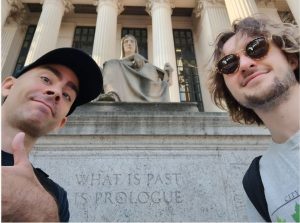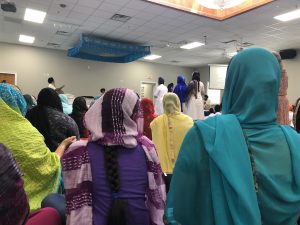Multifaith Scholars at Elon
The Multifaith Scholars program is a two-year, closely mentored, experientially rich, and academically rigorous educational opportunity for juniors and seniors who show great potential as intellectually curious and socially engaged multifaith leaders. Scholarships provide $5000 annually in the junior and senior year to support the personal and academic development of selected students.

Multifaith Scholar, Sandoh Ahmadu ’25, during a visit to India.
Who Should Apply?
Scholarships fund students of any major committed to developing a sophisticated knowledge about religious diversity and multifaith issues, interacting with local and global religious communities, and advancing a public intellectual project. Students apply in their sophomore year and begin the program in their junior year.
What Will Multifaith Scholars Do?
In order to prepare themselves for multifaith leadership on campus and beyond, students in this program undertake academic course work, a two-year undergraduate research project, and co-curricular engagement with local communities that will promote multifaith learning and reflection inspired by religious diversity. Students accepted into the program will complete either a major in Religious Studies or a minor in Interreligious Studies.

Multifaith Scholar, Andy Walter, ’24, in Washington D.C. for archival research with mentor, Andrew Monteith, Associate Professor of Religious Studies.
In the junior year, students will begin working with mentors on their research projects, continue to take classes in the major or minor, and participate in community engagement initiatives with the program director. Juniors will also work closely with their mentors to plan global engagement (e.g., study abroad or study away), internship, and/or more intensive research experiences that deepen and broaden their development, with the aim of engaging every scholar in community engagement and research experiences that advance and complement their development as multifaith leaders.
In the senior year, students will assume active campus leadership roles, working with faculty in residential neighborhoods, the Truitt Center for Religious and Spiritual Life, or the Center for the Study of Religion, Culture, and Society to organize educational events around issues of religion in a global context.
What Career Opportunities Does the Program Prepare Students For?

Multifaith Scholars visit the Sikh Gurudwara of North Carolina in Durham.
Those students who complete the Multifaith Scholars program will possess a uniquely strong foundation to enter multifaith work of many kinds—including through employment in higher education, through positions within the expanding network of interfaith organizations in urban centers across the U.S., through coordinating outreach for communities of faith and non-profits, and in a growing number of governmental and non-governmental positions across the globe fostering relationships across religions and cultures. In addition, the program will train students to productively and creatively address religious diversity in career fields related to their own specific majors, from business to psychology to public health. They will be prepared to enter this work not only with clarity and awareness of their own strengths and promise but also with the skills that will help them proactively pursue leadership and innovation in multifaith work gained through academic inquiry, first-hand experiences, mentoring, and advising.
History of the Multifaith Scholars Program
In 2015, Elon received a grant from the Arthur Vining Davis Foundation to build a program dedicated to undergraduate research and community engagement that would foster high-impact, experiential learning about the intersections of religious traditions.
The Multifaith Scholars program was established within Elon’s Center for the Study of Religion, Culture, and Society, and its first director, Dr. Amy Allocco, was appointed to implement the program and recruit its first class, which was welcomed in 2017. Following the tremendous success of the MFS program and the high quality research its students produced, Elon assumed full funding of the program at the close of the grant period. MFS have presented widely at academic conferences, published their research in peer-reviewed venues, offered leadership within the campus community and with community partners, and engaged in public scholarship aimed at sharing their knowledge with multiple audiences. Graduates have gone on to competitive graduate programs in international relations and religious studies, US State Department-funded language study, and national and international service fellowships.